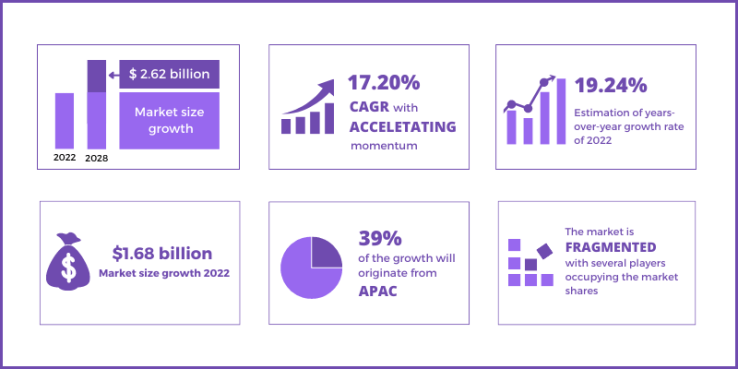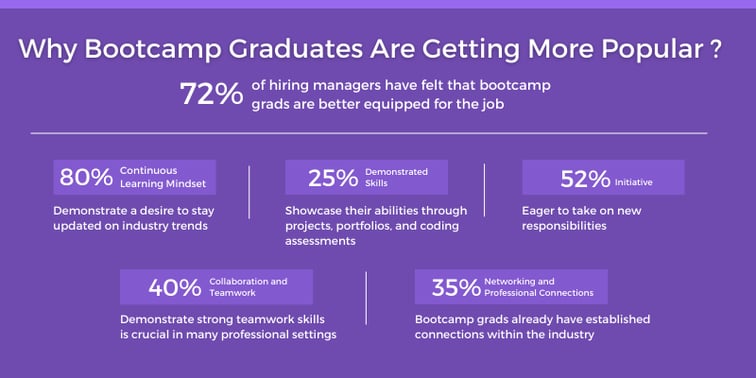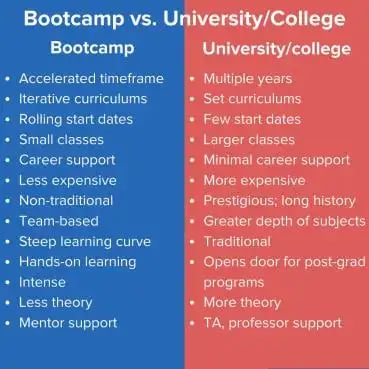Breaking the Mold: Employers Think Bootcamp Grads are “Just as Prepared”
Summary
In recent years, coding bootcamps have gained immense popularity as an alternative education path for aspiring tech professionals.
However, doubts and skepticism about the preparedness of bootcamp graduates compared to traditional graduates have persisted among employers.
This blog challenges the common assumptions surrounding bootcamp education and highlights the changing attitudes of employers towards bootcamp graduates.
In recent years, the traditional higher education landscape has witnessed a significant shift. Bootcamps have emerged as a viable alternative for individuals seeking to enter the job market swiftly.
Employers think bootcamp graduates are just as prepared and capable as those with degrees. The number of job postings specifically seeking bootcamp graduates has also steadily increased over the past few years. This indicates that companies recognize the value of the skills and experience that bootcamp graduates bring.
However, the perception of bootcamp graduates by employers has often been met with skepticism. Yet, there is a notable change underway. Increasingly, employers recognise that bootcamp graduates are just as prepared, if not more so, to meet the demands of today's evolving workforce.

The Evolution of Bootcamps
-
Coding bootcamps originated as a response to the growing demand for skilled tech professionals. In the early stages, they focused primarily on teaching basic coding skills to individuals seeking career transitions or entry-level positions.
-
As the tech industry evolved, bootcamps adapted to address the demand for practical skills and industry relevance. They incorporated more advanced technologies, programming languages, and frameworks into their curricula to align with industry needs.
-
The growth of bootcamp graduates entering the job market is a testament to the effectiveness of these programs. According to a study by Course Report, bootcamp graduates' employment rates have consistently risen, with many securing well-paying jobs in reputable companies.
Employer Perception Challenges
-
Bootcamp graduates initially faced scepticism and doubts from employers due to the unfamiliarity with this educational model. Traditional degrees were considered the gold standard, and employers questioned the quality and depth of education provided by bootcamps.
-
Misconceptions about bootcamp education often centered around the perception that bootcamps solely focused on practical skills and lacked the necessary theoretical foundations. Some employers believed that bootcamp graduates lacked critical thinking abilities and were ill-prepared to handle complex challenges.
-
Employer reservations about bootcamp graduates were also influenced by concerns about accreditation and the rigorousness of bootcamp training. Without clear industry standards or universally recognized credentials, employers were unsure about the consistency and depth of knowledge acquired through bootcamps.
Bootcamp Graduate Skills and Preparedness
- Bootcamps focus on equipping students with practical coding skills that are immediately applicable in real-world scenarios. Graduates are proficient in coding languages such as Python, JavaScript, or Ruby and have hands-on experience with popular frameworks and tools.
- The intensive nature of bootcamp programs fosters resilience, adaptability, and the ability to work under pressure. Bootcamp graduates are accustomed to fast-paced learning environments and have developed problem-solving skills that enable them to tackle complex challenges efficiently.
- When comparing the curriculum and outcomes of bootcamps with traditional higher education programs, bootcamps often prioritize skills that are directly relevant to industry needs. While traditional degrees provide a broader educational foundation, bootcamp graduates possess targeted, job-specific skills that make them immediately valuable to employers.
Why Companies have opened up to hiring Bootcamp Grads
Employers are re-evaluating their expectations and opening up to non-traditional educational paths. They understand the fast-paced, dynamic nature of certain industries requires individuals with practical skills and the ability to adapt quickly.

Factors Contributing to Employers' Confidence
When hiring bootcamp graduates, employers may gain confidence based on several factors that demonstrate the competence and potential of these candidates. Here are some factors that contribute to employers' confidence when hiring bootcamp grads,
-
Curriculum and Intensive Training - Bootcamps are often focused on, intensive training in relevant technologies, giving graduates a deep understanding of their chosen field. Employers value this specialized expertise and the ability to hit the ground running.
-
Emphasis on Real-World Applications - Bootcamp programs emphasize hands-on projects, allowing students to develop solutions to real-world challenges. This approach ensures that graduates have experience tackling practical problems, making them highly adaptable to workplace demands.
-
Collaboration and Teamwork Skills - Many bootcamps incorporate collaborative projects, simulating team-based work environments. Graduates emerge with strong teamwork skills, which are highly valued in today's collaborative workplaces.
-
Rapid Skill Acquisition - Employers appreciate bootcamp graduates' ability to acquire new skills quickly. Bootcamps are designed to provide accelerated learning, and graduates who demonstrate the capacity to learn and adapt efficiently are seen as valuable assets in fast-paced and evolving industries.
-
Professional Networks - Bootcamps often provide opportunities for students to build connections with industry professionals, mentors, and alumni. Employers may view graduates who have established professional networks as individuals who are proactive, resourceful, and have access to additional support and guidance.
-
Demonstrated Initiative - Employers value bootcamp grads who have taken initiative beyond the standard curriculum. This includes pursuing additional learning opportunities, engaging in personal projects, contributing to open-source projects, or actively participating in relevant communities. Such initiative reflects self-motivation, a growth mindset, and a commitment to continuous learning.
-
Portfolio and Demonstrable Work - A strong portfolio showcasing projects, applications, or websites that bootcamp graduates have developed can significantly enhance employers' confidence. Tangible evidence of the candidate's work allows employers to assess the quality, creativity, and practical applicability of their skills.

Success Stories and Positive Outcomes
There are multiple stories from students and employers that serve as testimony.
Exemplary Bootcamp Graduates
Numerous data science bootcamp graduates have defied scepticism and succeeded in their respective industries. These success stories showcase the capability and preparedness of bootcamp graduates.
Aeronautical Engineer to a BI Analyst @ Blend360 with 10 LPA! Lokesh's Career Success Story
Employer Testimonials
Employers who have hired bootcamp graduates frequently praise their skills, work ethic, and ability to make an immediate impact. These testimonials highlight the value that employers place on bootcamp education.
Bridge the Gap: Employer-Bootcamp Collaboration
-
Collaborations between bootcamps and employers play a crucial role in bridging the gap in perceptions. Many bootcamps actively involve industry professionals as instructors or mentors, ensuring that the curriculum remains up-to-date and aligned with current industry practices.
-
Initiatives such as internships, apprenticeships, or project partnerships between bootcamps and companies provide opportunities for employers to observe the capabilities of bootcamp graduates firsthand and build trust in their abilities.
-
Hiring bootcamp graduates can be beneficial for employers. These graduates bring fresh perspectives, diverse backgrounds, and a willingness to adapt quickly to new technologies and industry demands, contributing to the growth and innovation of organizations.
Final Thoughts
The tides are turning, and employers are recognizing the value and preparedness of bootcamp graduates. As the job market continues to evolve, bootcamps have proven their effectiveness in equipping individuals with practical skills and the ability to adapt quickly.
By embracing the potential of bootcamp education, employers open up new opportunities for themselves and tap into a pool of talented individuals who are ready to contribute from day one. It's time to break the mold and acknowledge that bootcamp graduates are "just as prepared" for the challenges of the modern workforce.








